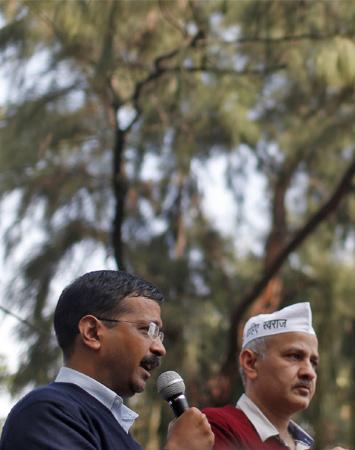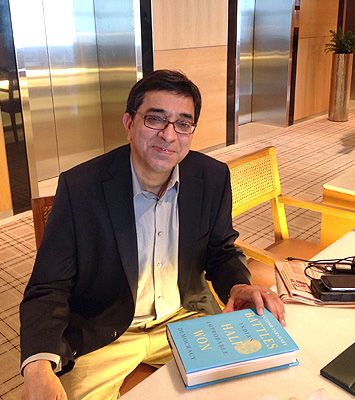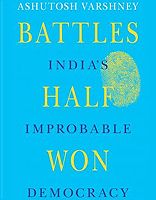 'Indian politics has had three-and-a-half master narratives -- secular nationalism, Hindu nationalism, justice for lower castes and regionalism. The AAP seeks to go beyond that. Therein lies its promise and its challenge,' says Ashutosh Varshney, Brown University professor and author of Battles Half Won, India's Improbable Democracy.
'Indian politics has had three-and-a-half master narratives -- secular nationalism, Hindu nationalism, justice for lower castes and regionalism. The AAP seeks to go beyond that. Therein lies its promise and its challenge,' says Ashutosh Varshney, Brown University professor and author of Battles Half Won, India's Improbable Democracy.
Political scientist and writer, Professor Ashutosh Varshney's fourth book Battles Half Won, India's Improbable Democracy is a scholarly insight into the deepening of India's democracy.
The book argues that India has done exceedingly well as an electoral democracy and is actually an electoral wonder, but Indian democracy has not done very well between elections.
"The battle for deeper democracy is primarily about how to make Indian polity more responsive and accountable between elections and the AAP is plugging into precisely this problem," says Professor Varshney, below, left, the Sol Goldman Professor of International Studies and Social Sciences at Brown University, Rhode Island, USA.
An alumnus of Jawaharlal Nehru University, the Massachusetts Institute of Technology and a former professor at Harvard, the Uttar Pradesh-born Varshney is a leading scholar on India.
On a recent visit to Mumbai for the launch of his book, he spoke to Rediff.com's Archana Masih about the emergence of the AAP, the challenges before the Congress and the BJP and why the 2014 election is one we have not seen in a long time.
Continuing our Election 2014 interviews with experts on Indian politics:
Your book Battles Half Won, India's Improbable Democracy mentions four democratic upsurges that India has seen. Are we seeing India's fifth democratic upsurge with the emergence of the Aam Aadmi Party?
I think so, but it is an upsurge of a very different kind. Its promise is that it seeks to undermine the conventional categories of politics.
Indian politics has had three-and-a-half master narratives -- secular nationalism, Hindu nationalism, justice for the lower castes and regionalism. The AAP seeks to go beyond that.
Therein lies its promise and its challenge.
This upsurge is essentially tapping into urban anxiety. The rural potential of the AAP-led upsurge is still to be assessed, seen and judged. With the exception of Haryana, it remains urban.
The urban excitement is no longer in doubt. The urban middle class is coming back to electoral politics.
Has AAP gone too far as demonstrated by this week's protests in Delhi? Should they not be focusing on governance? Are they committing a big mistake and undermining democracy?
Even Mahatma Gandhi, India's best protestor ever, argued that civil disobedience had to be exercised with wisdom and caution -- and infrequently.
Kejriwal is not wrong to say that Delhi's police should be under the Delhi government, but is this the right method of realising that objective?
One must question the approach, while agreeing with the objective.
How do you see the party evolve?
The book argues that India has done exceedingly well as an electoral democracy. It is actually an electoral wonder.
Political Science would not have predicted the survival of democracy in India. It goes against existing canons of theory.
While the electoral dimension has been a great success, India's democracy hasn't done very well between elections.
The battle for deeper democracy is primarily about how to make Indian polity more responsive and accountable between elections.
The AAP is plugging into precisely this problem. What is its biggest ID today? Bring the normal functioning of the Indian polity closer to citizens.
It can be called citizenship-based politics.
The first instinct of Indian political parties between elections is to ignore issues that have no electoral value, however important they may be otherwise.
Indian democracy is heavily weighted towards rural India because that's where the numbers are while urban problems have been ignored.
The AAP is certainly taking the right steps towards making democracy deeper.
Elections are a very important constituent of modern citizenship, but citizenship is not only about voting. The AAP is turning 'between elections' issues into election issues.
How far can citizenship issues can be turned into long-time electoral issues remains open to judgement.
Do you believe the AAP could have a lasting impact in Indian politics?
It has a reasonably developed political philosophy, what it needs is an economic philosophy.
Until it comes up with a good economic philosophy, its long-term potential will remain open to question.
A well thought economic philosophy is what every serious political and economic observer is waiting for.
To expect it to deliver an economic blueprint so quickly will be unrealistic, but we are waiting for that.
Ramachandra Guha recently tweeted that 'we have too many person-and-family-centric parties already. Even the BJP has become a personality cult. Kejriwal must keep groupies at bay.' If the AAP has to continue to do things differently, what does it have to be cautious about?
AAP leaders are average citizens of India. This is not a party born out of political pedigree, this is a party born out of citizen interest and citizen activism.
It has broken the mould.
Any mass movement needs trusted lieutenants, but in order for it to not repeat the mistakes of conventional political parties, it has to make sure it doesn't generate family, religion, caste-based patronage and continues to mobilise people on issues it holds dear.
Otherwise, it will fall into clientelistic democratic politics which India has had quite a lot of.
Its beginning is promising, but a great deal of its struggle lies ahead.
From protest to governance is a big transition.
Will it compel parties like the Congress and BJP to reframe their political agendas, and the manner in which they approach voters?
Certainly the two leading political parties are feeling a sense of threat.
Whether it is going to be a long-time impact on how political parties function will depend a lot on its performance in May.
In May, it must deliver a minimum of 15 to 20 seats. If it gets 30 to 40, it will easily be the 3-4th largest party and will change the politics of this country.
With 15 to 20, it will have an impact.
With less than 10, people will say we don't have to pay attention now.
Won't its performance in Delhi impact its national ambitions?
Unless they commit a blunder in Delhi, most people are ready to give them a chance.
You don't judge a government in three months.
The urban middle class felt so marginalised and is responding very well to the AAP.
At the moment May looks promising for the AAP.
 Do you think it erred in a populist manifesto that may eventually be economically unfeasible?
Do you think it erred in a populist manifesto that may eventually be economically unfeasible?
Arvind Kejriwal's book Swaraj has a fairly developed political plan especially towards decentralisation and a reasonably interesting argument about why government schemes for mass welfare do not work.
He is opposed to NREGA, his claim is that funds should be untied and people should decide how to use their funds.
This is a fairly developed and coherent plan for changing the politics of the country, but there is very little there about economic policies except some statements about the chota vyapari (small trader).
He says government harasses the small businessman, but that is connected to his conception of how government has been utterly corrupt.
His belief is in the people's capacity of governing themselves, but I think they are overdoing it.
You can't go to people with referenda all the time.
That actually undermines governance, it does not promote governance. You can't have national level referenda all the time.
He is very enamoured of Swiss democracy, but Switzerland has 8.014 million people, Delhi is twice as large, Mumbai is two-and-a-half times larger.
The idea of referendum is not invalid per se, but should be infrequently used, when there is profound doubt about an important policy.
The cell phone referendum about whether they should form the government was a very smart political move because they didn't have the mandate. But you can't do it all the time.
Has Arvind Kejriwal become the biggest challenger to Narendra Modi, more than a dispirited Congress?
The Congress won an unexpected large number of urban seats in 2009. In 2014, the Congress was expected to lose those urban seats to the BJP.
If the AAP wins 30 seats, then it is very likely that 25 of those would have gone to the BJP.
Therefore, the BJP's sense of threat is real because the urban vote was almost certain to go to Mr Modi.
The Congress had some kind of rural strategy, but its urban strategy wasn't clear at all.
The AAP's rise does hurt the BJP. The assumption was that the Congress was going to decline, but the assumption was also that the Congress loss would be the BJP's gain.
That equation has become very complicated.
Has Kejriwal stolen the thunder from Modi?
Kejriwal has become a symbol of urban middle class hope.
Modi had become one and now another symbol has emerged which means that in this next election whatever happens in rural India -- it will remain a Congress versus BJP versus regional parties fight -- in urban India, the contest has changed as of now.
Television, which basically addresses urban India, is driven by urban interest and is run by urbanites -- at least on TV it will be Kejriwal versus Modi. But we know it cannot be the all India or the rural story.
But a proviso must be added -- when waves emerge in politics, conventional political analysis is knocked out.
1977 defied all categories, 1989 under V P Singh also to some extent.
There have been waves in regional spaces -- N T Rama Rao, the Asom Gana Parishad in Assam -- waves are exponential.
Conventional analysis cannot deal with exponential drives.
If at all, it is a bigger wave, then why restrict the prediction to 30 to 40?
Even with 30 to 40 they will transform politics.
If it is bigger, then it will be an electoral revolution, a critically realigning election.
The social bases of parties will radically shift.
The Congress in its own estimate knows it is losing. If suppose it drops below 100 and the AAP rises to 70 or 80 it will be truly revolutionary.
That means in the next election, they might be the second largest party.
It will start gobbling the Congress space and the future of Indian politics might begin to look like the BJP versus the AAP.
We can't rule out those possibilities because we don't know how big the wave is.
As of now, 30 to 40 will be a very big achievement. 15 to 20 will be quite respectable. Less than 10, the enormous enthusiasm we've seen will dissipate.
The AAP has surely captured people's imagination and is attracting members in droves.
There is a wave currently in evidence. How big it will become will determine its long run future.
In the short run it is changing discourse, changing expectations, forcing political parties to readjust their strategies and it is causing a threat most of all to Mr Modi.
The threat is not that Mr Modi will drop to 100. The threat is Mr Modi will not reach 180.
Therefore, one must not be surprised that the Congress appears to have a soft attitude towards the AAP because it already assumed that it is going to be a loser.
 If the Congress is going to lose, they would want that Modi doesn't cross 200 and become so formidable. It seems the AAP can stop that as of now.
If the Congress is going to lose, they would want that Modi doesn't cross 200 and become so formidable. It seems the AAP can stop that as of now.
Modi and the BJP are still the front runners. One should remember that. It cannot be ruled out that they will get to 180, but the odds have lowered.
Part II of the interview: 'Modi is both a very exciting and polarising figure'
Buy Battles Half Won, India's Improbable Democracy at Rediff Shopping.
Image: Delhi Chief Minister Arvind Kejriwal and Urban Development Minister Manish Sisodia during their protest against the city police in New Delhi. Photograph: Ahmad Masood/ Reuters.
Inset: Professor Ashutosh Varshney in Mumbai. Photograph: Archana Masih/Rediff.com











 © 2025
© 2025